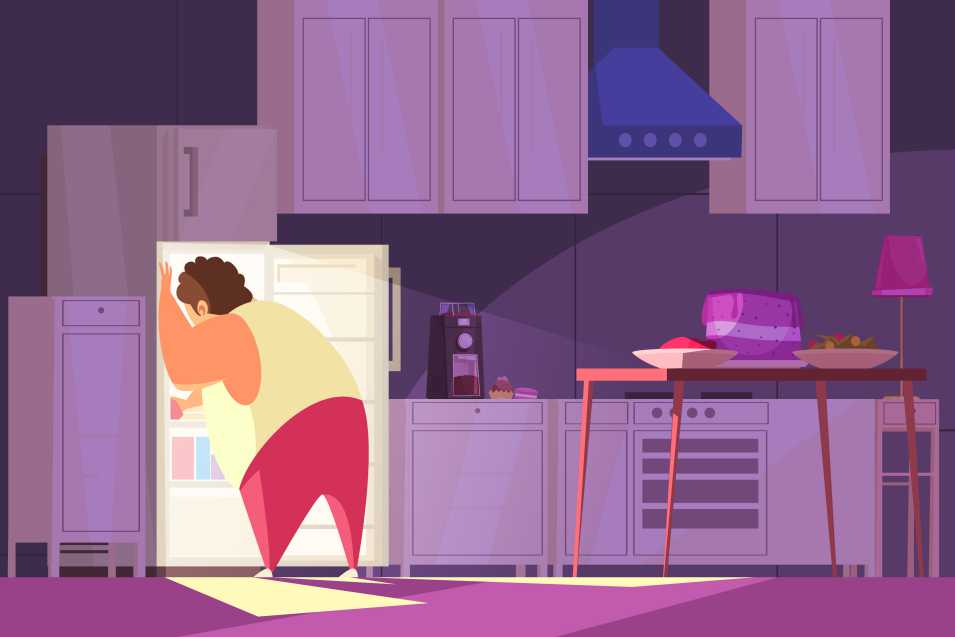Why Do I Binge Eat At Night? In today’s fast-paced and stressful world, many individuals struggle with emotional eating. Night-time binge eating, in particular, can become a problematic habit that affects both physical and emotional well-being. Identifying and addressing the underlying triggers behind this behavior is crucial to regain control and establish a healthier relationship with food. Why do i binge eat at night? If so, the suggestions in our article will be very useful to you.
Why Do I Binge Eat At Night? Night-Time Binge Eating
Many people struggle with binge eating, particularly at night. This behavior can be puzzling and frustrating, leaving individuals wondering why they engage in this harmful habit. To gain a deeper understanding of night-time binge eating, it is essential to explore the underlying factors that contribute to this behavior.
Firstly, emotional triggers play a significant role in night-time binge eating. Stress, anxiety, loneliness, and sadness can all contribute to the urge to overeat during nighttime hours. Food often becomes a source of comfort and a way to cope with negative emotions. This emotional connection to food can be intensified during the evening when individuals are more likely to be alone and have fewer distractions.
Another factor that impacts night-time binge eating is the impact of stress and fatigue. After a long and tiring day, individuals may find themselves turning to food as a way to relax and unwind. The combination of stress and fatigue can weaken self-control and make it easier to give in to cravings for unhealthy, calorie-dense foods.
Furthermore, boredom can also contribute to night-time binge eating. When individuals have excess free time in the evenings, they may resort to eating as a form of entertainment or distraction. This mindless eating often leads to overconsumption, as the focus is on satisfying the boredom rather than paying attention to hunger cues.
Various strategies may be helpful for overcoming nighttime binge eating. First, it is crucial to identify and address the emotional triggers that contribute to the behavior. Finding alternative coping mechanisms, such as practicing mindfulness, engaging in hobbies, or seeking therapy, can help you manage emotions without relying on food.
Additionally, establishing a consistent sleep schedule and prioritizing self-care can reduce stress and fatigue, making it easier to resist nighttime cravings. Creating a structured and fulfilling evening routine can also help combat boredom and prevent mindless eating.
If struggling with night-time binge eating becomes overwhelming, seeking professional help from a therapist or counselor is an excellent step to take. These professionals can provide guidance and support, helping individuals develop healthier coping mechanisms and behaviors surrounding food.
Emotional Triggers For Night-Time Binge Eating
Emotional triggers play a significant role in night-time binge eating, a behavior that affects many individuals. When the sun sets and darkness falls, our minds can become more susceptible to emotional turmoil, leading us to seek solace in food. But why do I binge eat at night? The answer lies in the complex relationship between emotions and our eating habits. Emotional triggers such as stress, sadness, loneliness, and anxiety can all contribute to night-time binge eating.
The act of binge eating often serves as a means of coping with these overwhelming emotions. In times of stress or sadness, individuals may turn to food as a form of temporary comfort or distraction. The act of consuming large quantities of food can elicit feelings of pleasure and provide a sense of control in a chaotic world.
Loneliness and anxiety are also known to be significant emotional triggers for night-time binge eating. The silent hours of the night can amplify feelings of isolation and social disconnection, making individuals more vulnerable to turning to food for comfort and companionship. Additionally, anxiety can heighten one’s emotional state, leading to a heightened desire for food as a coping mechanism.

Impact Of Stress And Fatigue On Night-Time Binge Eating
Mental and emotional stress can significantly contribute to night-time binge eating. When individuals experience high levels of stress, their bodies release cortisol, commonly known as the stress hormone. This hormone can stimulate cravings for comfort foods that are typically high in sugar and fat. The act of binge eating may temporarily provide a sense of relief from stress and negative emotions, creating a vicious cycle.
Fatigue is another factor that can influence night-time binge eating. When we are tired, our self-control becomes weakened, making it harder to resist food cravings. Additionally, fatigue can disrupt our hunger hormones, such as ghrelin and leptin, which regulate appetite. This imbalance can exaggerate feelings of hunger, leading to increased food intake, especially during the night when self-control may already be compromised.
| Signs of stress and fatigue-induced night-time binge eating: | Strategies to manage stress and fatigue-based binge eating: |
|---|---|
|
|
The Role Of Boredom In Night-Time Binge Eating
When it comes to night-time binge eating, there are several factors that can contribute to this behavior. One important factor that often goes unnoticed is the role of boredom. Many individuals find themselves engaging in excessive food consumption during the nighttime hours out of sheer boredom. This can be particularly problematic as it can lead to weight gain and other negative health consequences.
So, why do people experience increased binge eating at night when they are bored? One possible explanation is that food becomes a source of entertainment and distraction. When individuals have nothing else to do or are feeling restless, they may turn to food as a way to pass the time and alleviate their boredom. Additionally, eating can trigger the release of dopamine, a neurotransmitter that is associated with pleasure and reward. Therefore, indulging in high-calorie foods during periods of boredom can provide a temporary sense of enjoyment.
The act of consuming food can also provide a sense of comfort and fill the void that boredom creates. When individuals are lacking stimulation or meaningful activities, they may seek solace in food. This emotional aspect of night-time binge eating is often overlooked, but it is crucial to understanding and addressing this behavior. Boredom-induced binge eating can become a vicious cycle, as individuals may feel guilty or ashamed after overeating, leading to more negative emotions and boredom in the future.
If you find yourself regularly engaging in night-time binge eating due to boredom, there are several strategies you can try to overcome this behavior. First and foremost, it is important to address the underlying boredom. Finding activities that you enjoy and that provide meaning and stimulation can help reduce the desire to turn to food for entertainment. Engaging in hobbies, spending time with loved ones, or pursuing new interests can all be effective ways to combat boredom.
Tips For Overcoming Night-Time Binge Eating
1. Create a structured eating schedule: One of the reasons why people tend to binge eat at night is because they may have irregular eating patterns throughout the day. By establishing a consistent eating schedule with regular meals and snacks, you can help stabilize your hunger levels and reduce the likelihood of late-night overeating.
2. Identify and address emotional triggers: Emotional triggers can play a significant role in night-time binge eating. It’s important to identify what emotions or situations cause you to turn to food for comfort or distraction. Once you understand these triggers, you can develop healthier coping mechanisms such as engaging in relaxation techniques, journaling, or seeking support from friends and family.
3. Keep a food journal: Keeping track of your food intake can provide valuable insights into your eating patterns and help you become more mindful of your choices. Write down what you eat, when you eat, and how you feel before and after each meal or snack. This self-awareness can help you identify problematic eating behaviors and make necessary changes.
4. Choose nutrient-dense foods: Opting for nutrient-dense foods that are rich in vitamins, minerals, and fiber can help keep you satiated for longer periods and reduce the likelihood of night-time cravings. Include plenty of fruits, vegetables, whole grains, lean proteins, and healthy fats in your meals to support overall satisfaction and well-being.
5. Create a nighttime routine: Establishing a relaxing nighttime routine can help signal to your body and mind that it’s time to wind down and prepare for sleep. Engage in activities such as reading a book, taking a warm bath, or practicing gentle stretching or yoga. By focusing on self-care and relaxation, you can reduce the temptation to turn to food for comfort during the evening hours.
By incorporating these tips into your daily routine and being patient with yourself, you can gradually overcome nighttime binge eating. If you’re having trouble managing this behavior on your own, remember that it’s important to seek professional help. With the right support and strategies, you can develop a healthy relationship with food and regain control over your eating habits.
